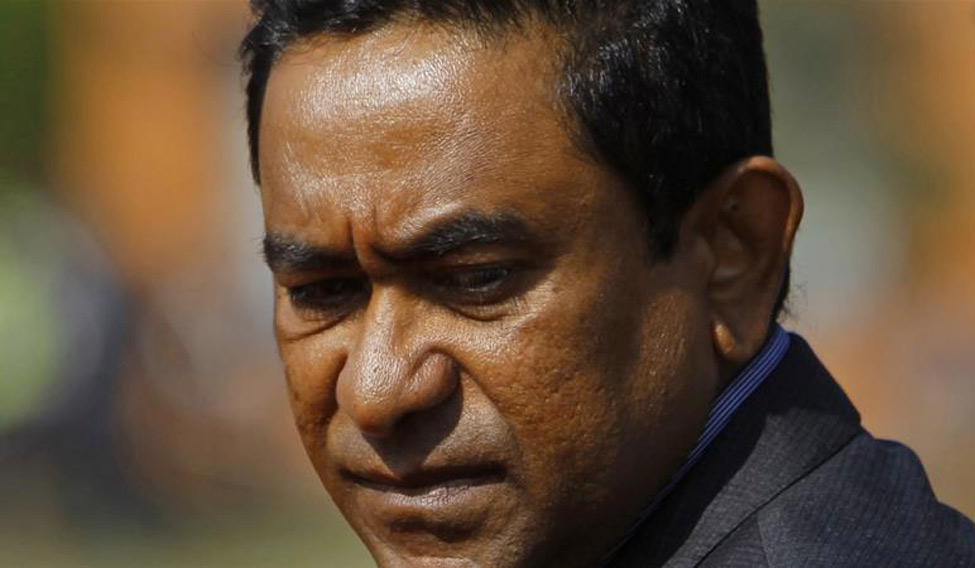Maldivian Foreign Minister and President Yameen’s ‘special envoy’ Mohamed Asim’s recent meeting with Prime Minister Narendra Modi in New Delhi, and the latter’s reported acceptance of the invitation to visit Maldives has gone mostly unreported in the Indian media. This visit could help the two nations reset their strained relations to earlier levels of mutual trust, respect and cooperation.
Maldives, like most other neighbours other than China and Pakistan, has been appearing on the Indian blip only if something momentous or democratic happens. Perceptions and exhibition of recent strains appeared after the Yameen government had the parliament pass the nation’s maiden FTA with China, at short-notice. The president, too, followed it up with a state visit to Beijing, again without advance information to his own people.
India has been concerned ever since the Yameen leadership began tilting towards China since his coming to power through controversial elections in November 2013. Already, there were Indian concerns about the future of democracy in that country, along with rumours of recruitment of Maldivian youth for the IS ranks.
Yameen's concerns towards India owed to the earlier ‘GMR fiasco’ and the coincidental tagging of an inevitable ban on Indian sand imports and withdrawal of visa-on-arrival for Maldivians. The Yameen camp concluded early on that New Delhi continued to be more sympathetic to former President Mohammed Nasheed, who jumped Maldivian prison rules and court orders, by obtaining ‘political asylum’ in the UK. Nasheed is now launching anti-government campaign from the UK in the long run-up to presidential polls that are due later this year.
Though not expressed in clear terms, the visa issue owed to reports of Maldivian youth possibly using India to travel to IS fronts in Syria and Iraq. Tamil Nadu, from where river sand for construction work used to be mined illegally and transported to Maldives, is now a net importer of the commodity from Malaysia.
‘Suitable time’
Minister Asim’s Delhi visit was aimed at resetting the bilateral clock to the times of earlier times of mutual bonhomie and trust. Though pre-visit reports in a section of the Indian media indicated a possible January visit by Modi, no dates were announced after Asim’s meetings in Delhi, which also included one with External Affairs Minister Sushma Swaraj. At these meetings, the two nations have also decided to fast-track the bilateral FTA. Male claims that India was slow in negotiating and finalising the FTA, as against a fast-tracked Chinese approach as with development funding and projects-execution.
The Maldivian foreign ministry has since announced that the Modi visit would take place at a ‘suitable time’. The Maldivian announcement thus raises the question if the Yameen leadership would like to have a last say in the matter, possibly pushing it closer to the presidential polls, and thus sending out sections of the political opposition in the country that India was with them, in their ‘fight for democracy’.
The Modi visit assumes significance as India had dropped Maldives from the prime minister’s unprecedented four-nation Indian Ocean neighbourhood tour in March 2015. After long silence, India has now acknowledged that the cancellation owed to Maldivian domestic situation, after the Yameen government had Nasheed arrested, tried and jailed for 13 years in the infamous ‘Judge Abdulla abduction case’ dating back to the latter’s self-aborted presidency in January 2012.
Even during the run-up to the 2013 presidential polls, Yameen had said that Indian tech people were helping the Maldivian Election Commission, whose members had been nominated by President Nasheed when in office, to manipulate poll results. Last year, Nasheed went to town saying that his invitation to speak at a Delhi seminar, funded by the Indian Ministry of External Affairs (MEA) proved where the Indian sympathies lay.
Stand-alone affair(s)?
The Indian decision to possibly revisit the past and work with Maldives to reset the clock back on bilateral ties seem to be flowing from the time-tested, all-American call for ‘supreme national self-interest’ at all times and seasons. It also means that India would not want itself to unwillingly allow itself to be seen as ‘interfering in the internal affairs of an immediate neighbour’, which is also against the long-held national tenet on neighbourhood policy in particular.
In short, India’s concerns on Maldivian democracy and on the China front would remain, as stand-alone issues. In the post-Cold War world, when India too has made a lot of foreign policy adjustments in the course of co-adjusting to the era of economic reforms, other nations in the neighbourhood, too, would need to decide on their stand-alone relations with such other nations as China or Saudi Arabia, whose influence over and investments in Maldives are also equally massive and visible.
Maldives conundrum
In doing so, India should be alive also to the uncanny Maldivian knack of providing space for ‘communist’ China to work in tandem with orthodox Saudi Arabia, without the two having to talk to each other, yet getting to come across each other, without crossing each other’s path. At the height of the war on LTTE terrorism in the last decade, common neighbour Sri Lanka used to claim that they could bring together India and the US, Pakistan and China, otherwise mutually incompatible military powers, to fight terrorism on its land against its sovereignty.
The Maldives’ conundrum for India is akin to the 21st century Maldives’ social reality of the traditional moderation and modernity in religious practices having to co-exist with neo-conservatives, and the political reality of democracy still struggling for space in a society entrenched in one-man rule of whatever kind over the past thousand years and more.
(The writer is Director, Chennai Chapter of the Observer Research Foundation, the multi-disciplinary Indian public-policy think-tank, headquartered in New Delhi. Email: sathiyam54@gmail.com)





